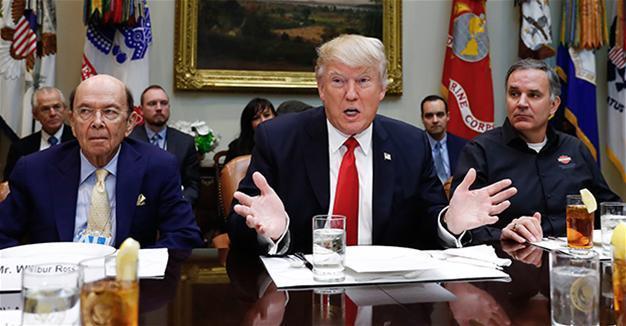Trump’s order ignores ISIL victims in Turkey
Serkan Demirtaş

AP photo
A presidential memorandum recently signed by U.S. President Donald Trump to instruct the Pentagon to develop a comprehensive plan to defeat the Islamic State of Iraq and the Syria (ISIL) ignored the group’s attacks in Turkey, as well as its victims, while citing incidents that occurred in the U.S. and in some European countries.
“ISIS has inspired attacks in the United States, including the December 2015 attack in San Bernardino, California, and the June 2016 attack in Orlando, Florida. ISIS is complicit in a number of terrorist attacks on our allies in which Americans have been wounded or killed, such as the November 2015 attack in Paris, France, the March 2016 attack in Brussels, Belgium, the July 2016 attack in Nice, France, and the December 2016 attack in Berlin, Germany,” read the memorandum issued on Jan. 28 by Trump.
The memorandum did not cite any ISIL attack carried out in Turkish territories since mid-2015, when the jihadist organization begun marking Turkey as one of the main targets because it opened its İncirlik base to the U.S.-led international coalition fighting the jihadist terrorists in Syria and Iraq.
It’s worth recalling the attacks that ISIL has staged across Turkey, claiming the lives of hundreds of civilians including foreigners.
On July 20, 2015 a suicide bomber killed 34 civilians in Suruç in Turkey’s southeastern of Şanlıurfa.
On Oct 10, 2015 twin suicide bombers killed 109 Turkish nationals in Ankara at a peace rally, the most deadly single terror attack in Turkey’s history.
On Jan. 12, 2016 another suicide bomber detonated himself in Istanbul’s historic Sultanahmet district, killing 11 German nationals.
On March 19, 2016, five civilians, including three Israelis and one Iranian, were killed in another ISIL attack in Istanbul’s Taksim area. In addition, one of the Israelis killed and one of the wounded Israelis were carrying U.S. passports.
On June 28, 2016, 45 people were killed by three ISIL gunmen at Istanbul’s Atatürk Airport.
On Aug 20, 2016, a teenage suicide bomber killed 57 in an ISIL attack in the southern province of Gaziantep.
On New Year’s Eve, in the early hours of 2017, a gunman killed 39 civilians at Istanbul’s Reina nightclub, in an attack that caused global outrage and condemnation, including from Trump himself.
None of these attacks were cited in Trump’s memorandum, although Turkey is (by far) ISIL’s most frequent target. Around 300 civilians have been killed in ISIL attacks in Turkey so far.
It is also noteworthy that the new U.S. Secretary of Defense James Mattis expressed gratitude to his Saudi counterpart for Saudi Arabia’s contribution to the fight against ISIL and other terrorism. He did not mention Turkey, despite the fact that it is right on the frontline.
‘Radical Islamic terrorism’Another notable detail in the memorandum is Trump’s continued use of the term “radical Islamic terrorism,” a definition that Turkish President Recep Tayyip Erdoğan has long denounced. In his Jan. 2 meeting with German Chancellor Angela Merkel, Erdoğan did not hesitate to publicly challenge her use of the definition “Islamist terror.”
Trump is likely to stick to this definition, as he did during his inaugural address, in which he vowed to fight against “radical Islamic terror.”
“ISIS is not the only threat from radical Islamic terrorism that the United States faces, but it is among the most vicious and aggressive. It is also attempting to create its own state, which ISIS claims as a ‘caliphate.’ But there can be no accommodation or negotiation with it. For those reasons I am directing my administration to develop a comprehensive plan to defeat ISIS,” read the presidential memorandum.
Trump-Erdoğan phone talk expected soon Another key aspect is the fact that Trump and Erdoğan has still not yet held a phone conversation, although two weeks have passed since the former was sworn in. Diplomatic sources say the first contact between the two presidents is expected to take place soon, either over the weekend or early next week.
Trump has so far held a number of phone talks with leaders across the world including Russia, France, Germany, Egypt, Japan, the United Arab Emirates, Saudi Arabia, South Korea, etc. He has welcomed British Prime Minister Theresa May and (briefly) King Abdullah of Jordan in Washington. Meanwhile, Mexican President Enrique Peria Nieto cancelled his trip to Washington after a spat with Trump, who also cut short his phone call with Australian Prime Minister Malcolm Turnbull amid a row on a refugee deal.
Given this picture, the first contact between Trump and Erdoğan will be very important in shaping the future of ties under the new administration, particularly on issues concerning Syria, the Middle East and the fight against ISIL.
